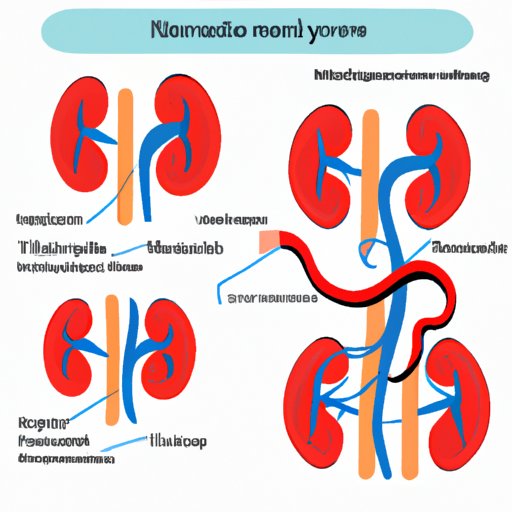Understanding Nephrons: The Essential Building Blocks of Healthy Kidneys
If you’re interested in maintaining healthy kidneys, it’s important to understand the role of nephrons, the tiny filtering units that make up most of each kidney. In this article, we’ll explore everything you need to know about nephrons, including their structure, function, and importance in overall kidney health.
III. A Basic Overview of Nephrons
A nephron is a tiny structure within the kidneys that helps filter waste and excess fluids from the blood. Each kidney contains around one million nephrons, so they are the essential building blocks of healthy kidneys.
Nephrons can be divided into two main parts: the renal corpuscle and the renal tubule. The renal corpuscle is made up of the glomerulus, a ball of capillaries, and Bowman’s capsule, a nearby cup-shaped structure. The renal tubule is a long, winding tube that is divided into several sections, including the proximal convoluted tubule, loop of Henle, and distal convoluted tubule.
III. How Nephrons Work: The Filtration Process
Nephrons work by filtering waste and excess fluids from the blood. The glomerulus, which is located within the Bowman’s capsule, is the first part of the filtration process. As blood flows through the glomerulus, waste and excess fluids are separated from the blood and form a liquid called filtrate. The filtrate then flows through the renal tubule, where different components of the tubule reabsorb different nutrients and fluids back into the blood. The remaining waste products and excess fluids are then excreted as urine.
IV. The Importance of Nephrons in Kidney Function and Overall Health
Healthy nephrons are essential for overall kidney function and wellness. In addition to filtering waste and excess fluids, nephrons also help to regulate blood pressure, pH balance, and electrolyte levels in the body. Malfunctioning nephrons can cause serious health problems, including kidney disease or failure, high blood pressure, and electrolyte imbalances.
V. Maintaining Healthy Nephrons: Tips for a Healthy Kidney
To maintain healthy nephrons, it’s important to practice good kidney health habits. These include eating a healthy, balanced diet, drinking plenty of water, avoiding excessive alcohol consumption, not smoking, and getting regular exercise. You should also take precautions to avoid kidney damage, such as wearing protective gear if you work in certain jobs that may expose your kidneys to harmful substances.
VI. Keeping Your Kidneys Healthy and Functioning
To keep your nephrons healthy, it’s important to prioritize your overall kidney health. This includes scheduling regular medical check-ups with your doctor and getting regular kidney function tests, especially if you have a family history of kidney disease or other kidney problems. If you’re concerned about your kidney function, don’t hesitate to seek medical attention. Early diagnosis and appropriate treatment can help protect your nephrons and preserve healthy kidney function.

VII. Conclusion: Understanding Nephrons is Vital For Maintaining Healthy Kidneys
Understanding the essential role that nephrons play in overall kidney health is essential for fostering healthy lifestyles and maintaining healthy kidneys. By staying informed about how your kidneys work and adopting healthy habits, you can help protect your nephrons and promote healthy kidneys for life.
